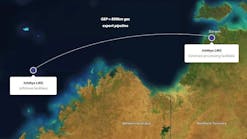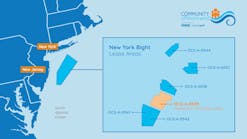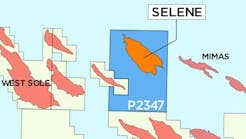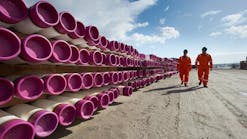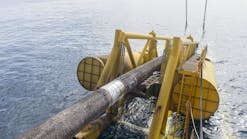$5 billion of contracts attainable for UK suppliers in tune with Indonesia's needs
Frank Frazer
Contributing Editor
Despite a history of oil production dating back to the last century, Indonesia has taken on a new status recently as a promising market for advanced technology and expertise tried and tested in the North Sea.
This is partly due to the increasing emphasis being placed on developing untapped offshore resources needed to maintain the country's role as a net exporter of energy within the booming Southeast Asia region in the 21st century.
But with weak oil prices putting pressure on spending across the board, leaders of Indonesia's long-established oil support industry have also shown interest in learning from North Sea experience in trimming both capital and operating costs as they embark on ambitious development programmes.
The business prospects which could arise from the new mood of realism will be put into focus at the first Indonesian Oil & Gas Technology conference and exhibition in Jakarta from December 6-9. Participants will include a British trade mission arranged by the Energy Industries Council which was appointed as sponsors for the event by the Department of Trade and Industry.
Indonesian interest in securing advanced technology to sustain oil and gas output is reflected by the support given by the Indonesian Ministry of Mines and Energy and the state oil company Pertamina to the Jakarta show.
Natuna challenge
Over the last few years the DTI's Oil and Gas Projects and Supplies Office (OSO) has closely monitored developments which could generate new business for UK suppliers as the industry in Indonesia enters a new phase. Opportunities include helping to meet the technical challenges of developing the massive Natuna gasfield as a long-term source of supply.
Because of the scale of expected investment in Indonesian waters, OSO officials estimate that business worth up to $25 billion could be open to foreign competition over the next five years. They have set a nominal target for UK firms of attaining 20% of that total, representing opportunities worth on average $1 billion a year.
But although Indonesia's authorities are keen to take advantage of technology available from other oil provinces, there are local circumstances which have to be taken into account in devising market strategies.
Ron McGeachie, OSO's area export manager for South East Asia, explained: "What companies wanting to do business in Indonesia must bear in mind is that they have to have a permanent presence there. They cannot go in and out on the odd visit or two and expect to receive any business."
According to McGeachie, one of the most effective ways of ensuring a presence is to set up joint ventures with local companies which can also help to meet requirements for a significant Indonesian content in oil and gas contracts (a trend encouraged by the Indonesian government). In the case of Natuna, the government appears to be aiming for a local content of at least 30%.
Another local aspiration which potential suppliers need to bear in mind is the desire to develop a skills base which will maximise the long-term benefits of oil and gas resources. "Training of Indonesia personnel is of the utmost importance and could be the real key to doing business in Indonesia," McGeachie said.
Norway demonstrated its awareness of this aspect of forging trading links when its prime minister Gro Harlem Brundtland, on a visit to Jakarta in September, pledged to increase the transfer of technology by signing a number of bilateral agreements. Deals clinched during the visit were said to be worth about $154 million.
Deepwater potential
Despite the international competition for shares in the Indonesian market, McGeachie is convinced that UK contractors are well positioned to provide specialised services and equipment suited to market needs.
Because present projections suggest that Indonesia could become a net oil importer by early next century, if the country does not replace existing output from onshore and shallow water offshore fields, there is a drive to encourage exploration in deeper water.
In the near term, this would mean adopting technology pioneered to tackle North Sea locations, including the use of advanced subsea systems which are readily available from UK suppliers. At a later stage, as exploration ventures into even deeper waters, there should be demand for floating production systems similar to those being installed for the first projects in the UK's Atlantic oil province.
OSO does not expect companies operating in Indonesian waters to seek UK contractors for fabrication of major structures when there is a strong capability to have this work performed locally or at established yards in neighbouring countries. But there should be scope for offering expertise in design engineering and specialist equipment for installation on platforms.
The biggest prizes could stem from successful bidding for shares of the Natuna project which will require about 70 gas turbines and large arrays of heat exchangers among equipment to handle up to 210 tcf of gas.
Offshore process plant will be needed to strip out the bulk of the carbon dioxide which makes up 71% of the gas content. It will be reinjected into two aquifers near the field while the sales gas is piped ashore to Natuna Island for further treatment and liquefaction.
Preliminary engineering work for the project - which will involve initially installing five offshore platforms and another 11 during a second phase - is being executed in Houston by Exxon, which formally agreed a development plan early this year with Pertamina. But it is planned to transfer management of the project to Indonesia after two or three years as part of the arrangement for maximising local content.
OSO, which has set up an internal Natuna working group to track opportunities arising from the project, plans trade missions for UK companies to both Houston and Jakarta which could provide specialist skills or products during the anticipated 17-year development programme.
Natuna, which will require investment of at least $40 billion and more than 70 million manhours in engineering and project management, should have sufficient reserves of sales gas to continue operating for at least 50 years. Those plans alone indicate the long-term opportunities for contractors establishing a presence in or near Indonesia.
Copyright 1995 Offshore. All Rights Reserved.
